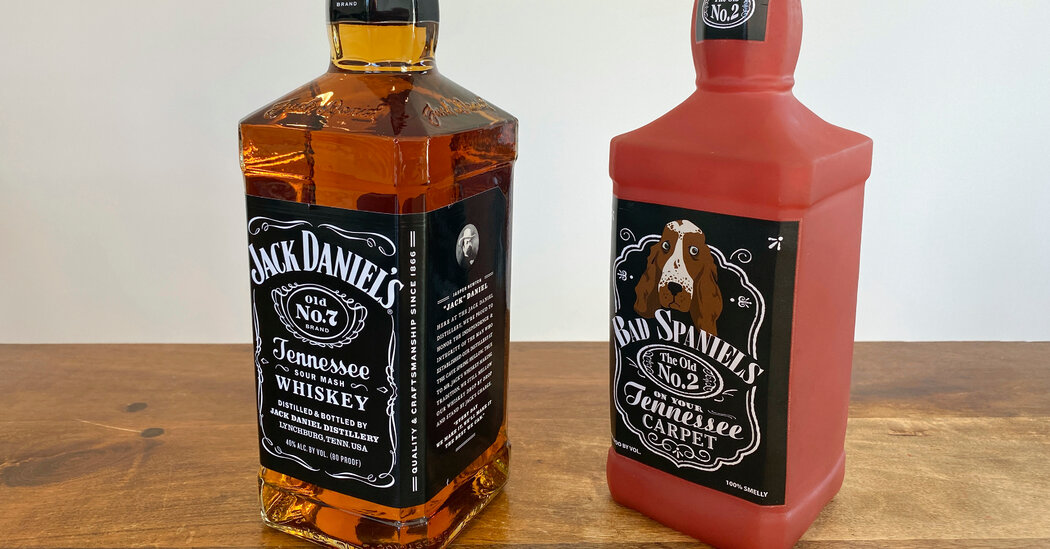The Supreme Court ruled Thursday that the First Amendment does not protect a dog chew toy that resembles a bottle of Jack Daniel’s from a lawsuit for trademark infringement.
The toy, the Bad Spaniels Silly Squeaker, has the shape and other distinguishing features of a bottle of Jack Daniel’s, but with, as one appellate judge put it, “lighthearted, dog-related modifications.”
The words “Old No. 7 Brand Tennessee Sour Mash Whiskey” on the bottle are replaced on the toy with “the Old No. 2, on your Tennessee carpet.” Where Jack Daniel’s says its product contains 40 percent alcohol by volume, Bad Spaniels is said to be “43 percent poop.”
A label attached to the toy says it is “not affiliated with the Jack Daniel Distillery”.
Judge Elena Kagan, writing for a unanimous court, seemed amused by the dispute. “This case is about dog toys and whiskey,” she wrote, “two items that rarely appear in the same sentence.”
She added that the characteristics of the whiskey bottle were known to almost everyone.
“A bottle of Jack Daniel’s — no, Jack Daniel’s Old No. 7 Tennessee Sour Mash Whiskey — has its fair share of trademarks,” she wrote. “Remember what the bottle looks like (or better yet, pick up a bottle wherever you keep booze; it’s probably there).”
After reproducing a color photograph of the bottle, she continued: “’Jack Daniel’s’ is a registered trademark, as is ‘Old No. 7.’ So is the arched Jack Daniel’s logo. And the stylized label with filigree (ie rotating white lines). Finally, what might be considered the platform for all those brands – the whiskey’s signature square bottle – is self-registered.
Trademark cases are generally about whether the public is likely to be confused about the source of a product. In the Bad Spaniels case, a unanimous three-judge panel of the Court of Appeals for the Ninth Circuit in San Francisco said the First Amendment required a more demanding test when the challenged product expressed an idea or point of view.
“The Bad Spaniels dog toy, while certainly not the equivalent of the Mona Lisa, is an expressive work” that uses irreverent humor and puns to poke fun at Jack Daniels, Judge Andrew D. Hurwitz wrote for the panel.
But Judge Kagan said there was no role in the case for “any First Amendment threshold filter.” On the contrary, she wrote, “the infringement claim stands or falls here with likelihood of confusion.”
That is the classic investigation in trademark cases. But Judge Kagan, when sending the case back to lower courts to analyze it, said the mockery of the chew toy with the liquor bottle had to feature in the analysis, as it wasn’t clear consumers would think Jack Daniel’s was responsible for a joke with toys. on it’s own.
Judge Samuel A. Alito Jr. made a similar point when the case was argued in March, imagining a pitch meeting with an executive from Jack Daniel’s.
“Someone from Jack Daniel’s comes up to the CEO and says, ‘I have a great idea for a product that we’re going to produce. It’s going to be a dog toy, and it’s going to be labeled a lot like our label, and it’s going to be called a lot like our name, Bad Spaniels, and what’s supposed to be in this dog toy is dog urine,” Judge Alito said, suggesting that consumers were unlikely to believe the chew toy had been produced or endorsed by the distiller.
Justice Kagan echoed the point in her opinion. “Consumers,” she wrote, “are less likely to think that the maker of a mocked product is mocking himself.” She added, “Self-contempt is one thing; self-mockery much less common.”
In a concurring opinion, Judge Sonia Sotomayor, along with Judge Alito, cautioned lower courts not to be too credulous in reviewing surveys, common in trademark litigation, “which purport to show that consumers are likely to be confused by an alleged infringing product. ”
Those surveys, she wrote, “may reflect a mistaken belief among some respondents that all parodies require permission from the owner of the parodied brand.”
In a Supreme Court letter in the case, Jack Daniel’s Properties v. VIP Products, No. 22-148, attorneys for the distiller wrote that “everybody likes a good joke.” But the chew toy, the briefing said, “confuses consumers by taking advantage of Jack Daniel’s hard-earned goodwill.”
Lawyers for the toy’s manufacturer, VIP Products, said it “followed in the playful parodic tradition that spanned more than half a century from Topps’ Wacky Packages trading cards to ‘Weird Al’ Yankovic.”
The trading cards, for counterfeit products that mimicked real ones, such as Ratz Crackers, Jolly Mean Giant, and Gulp Oil, were extremely popular in the 1970s, and for a time outsold Topps baseball cards. “Yet the world has not ended,” VIP Products told the judges.

